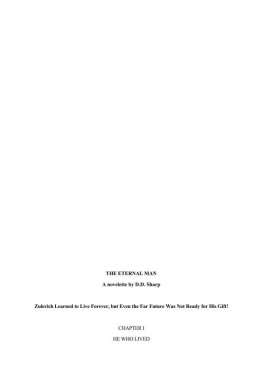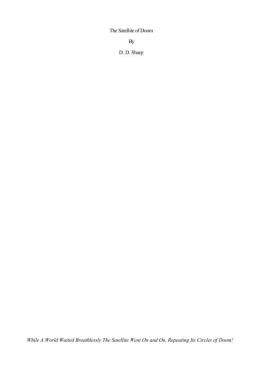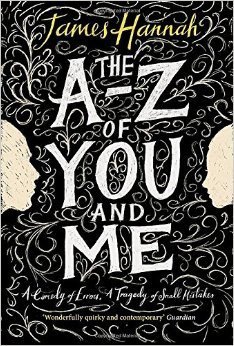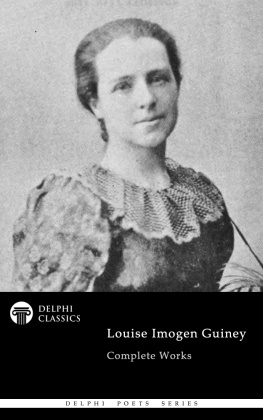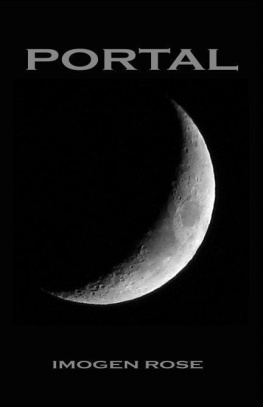e
r
u
t
c
i
P
e
r
u
t
c
i
P
THE ETERNAL MAN
A novelette by D.D. Sharp
Zulerich Learned to Live Forever, but Even the Far Future Was Not Ready for His Gift!
CHAPTER I
HE WHO LIVED
HERBERT Zulerich was a big heavy-framed man with a tangled mop of shaggy hair which lay back from his sloping forehead and clustered about the collar of his dark coat. His nose was big and prominent, jutting like a huge peak upon his face, and his mouth was a deep-lined canyon between that peak and the bulge of his chin.
Zulerich's habits were as strange as his face, ponderous as his big body. How he lived no one knew and no one knew either how he managed to maintain his formidable array of test tubes and retorts. In his laboratory was every conceivable kind of peculiar glass, holding liquids of all colors. Zulerich had been at one time a chemist of more than local fame but of late years he had become a recluse, staying alone most of the time in his big stone house, just back of the highway where the constant stream of autos seemed to disturb him but little.
In truth they disturbed him a great deal. Some days he would watch them in their hurry as they drove furiously along the straight tine of paved roadway and into his face would come gloom and melancholy. Into his large blue eyes would come a hurt look, and an odd feeling of sympathy for those who seemed so full of life, so gay, so thoughtless, would creep into his heart.
"Death! Death!" the old man would whisper. "Man goes through long years of preparation for the few days of accomplishment before the conqueror destroys all."
"So much preparation," he would whisper as he shook his big head. "So many brilliant minds polished and blazing for an hour, like roses grown and tended to be cut for an evening's bloom. Hands so skillfully trained and so soon folded quietly at rest."
That the old man was in quest of some great secret everyone who knew him had long ago suspected. But what that secret was no one knew and few could hazard even a guess.
THE truth was that Zulerich was obsessed by the single thoughtthe appalling waste of death. And since science and invention were conquering the other enemies of man's existence Zulerich had set out, after the example of Ponce de Leon, to discover the elements which might be combined to give man eternal life.
A fantastic quest, seemingly hopeless, yet Zulerich felt that he was making progress. He had discovered things which had astonished even him. Some of his experiments had awed and stupefied him and then he made a discovery which gave him a decided fright.
He had been experimenting with unicellular organisms and had found that they did not behave as inorganic chemicals did. He knew that the reaction of these animalcules was distinctly physiological, not merely physical, organic, not purely chemical.
They did not resemble any known chemicals, for they reacted as individuals and not as mere materials. This discovery, he found, was confirmed by Jennings in his book "Behavior of Unicellular Organisms." Old Zulerich had studied the intricate processes of cellular division and multiplication, hoping to penetrate the law of the organism and discover what it was that, at the peak of growth, prevented further cleavage of cells.
In short he wanted to find the principle which confined the limits of size and growth. Find what it was that caused the cells of a living body to increase and multiply until maturity and then cease growing except when incited by a cut or other accident to the tissue.
Why should a cell become active to replace wounded flesh, yet balk at rebuilding vital tissues, such as the lungs? Or refuse to replace a lost tooth more than once?
He experimented in numerous ways to provoke cell growth, trying to divine whether they had individualities of their own or whether they were bounded by the individuality of the whole. He wanted to find whether cells had an intelligence which caused them to do the remarkable things necessary to their coordination in the body.
Zulerich found out many thingsmystifying things which no amount of scientific theory could possibly explain. He perfected chemicals which, applied to a rabbit's head, caused its hair to grow so long as to make it necessary for him to gather it into a bag.
And even then the weight of it grew so great that the rabbit could no longer drag its load and he killed the animal out of mercy. But still its hair grew and grew.
His high-walled backyard soon held some monstrous freaks produced by his chemicalsdogs with heads as big as water barrels and bodies of normal sizerats with bodies as big as cows and heads no bigger than peanuts.
And one day he applied a chemical to a horse's eyes and the eyes grew out of their sockets like long ropes of white sinew with great knobs of gelatin-like irislimp flabby canes that dragged upon the ground.
The effect of this last experiment so cut the kind soul of Zulerich that he killed all the monstrosities and recoiled from the thought of making more. Then he looked again from his window over the wide world where death laid waste, sighed, tightened his lips and plunged into his work again. It was not growth that Zulerich wanted. He was quite content that man should retain his present stature. What he desired was to increase man's years.
And then he discovered it. He did not need to wait and watch until the end of time to determine whether or not cells would eventually die. He knew that they would not die . A few drops of the pale green fluid in the graduating glass he held in his hand would permit any man to live eternally. For he had at last found the combination he soughtthe chemical which continued life without the necessity of decay.
AFTER a year of experiment upon his cells he tried a drop upon a rat. He caught the rat in one hand and held his medicine dropper with its pale green fluid in the other.
But as the dropper released its globule the rat moved its head and the drop hit the side of its face, trickled down and spread about its throat. It left a scar upon the hair, a peculiar scar like a question mark. Zulerich tried again with a second drop with better success. The rat swallowed it. Zulerich watched carefully. The animal's heart seemed to cease beating. The lungs became motionless. And yet the rat lived with the fire of life in its pink eyes. It lived on, day after day, week after week, month after month, without the slightest loss of weight or sign of hunger or thirst. It lived with its tiny soul imprisoned inside it.
Yet even then Zulerich dared not himself drink the elixir, though his work was exhausting his strength and his heart was growing weakits flutterings made him take fright at times. For there was a flaw in his experiment.
True, the animal lived without breath, food or water. But it was entirely unable to move! Looking at it one would take it for dead, except for the glow in its fierce little eyes and the entire absence of decay. Zulerich set out to mend the flaw. He worked feverishly, knowing his time was short. He did not want to die with success just within his reach. He did not want to come so near offering mankind the boon it craved most of all only to fail when in sight of his goal.
A year passed before Zulerich found the ingredient lacking in his pale greenish drops. The very simplicity of the thing had caused him to overlook it in the beginning and his discovery of it was almost ludicrously accidental.
One day he had a pail containing a solution of cleansing soda near the windows and was washing down the dusty glass so that he might see out over the blighted world and gain strength from its curse to continue his work. He would allow no one else in his laboratory and washed the windows himself. A few spattering drops fell into the motionless upturned mouth of the rat where it stood upon the casement. Its mouth was open in the same position it had held when Zulerich had forced it to receive the life preserving drops. It had stood there, a tiny paralyzed living statue, while the four seasons of the year had gone by.
Next page
